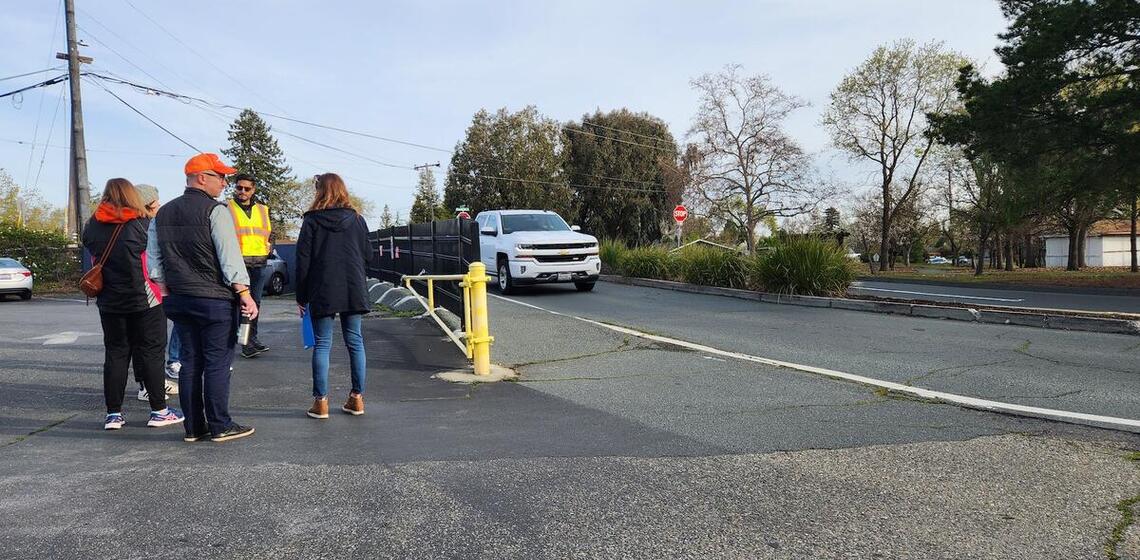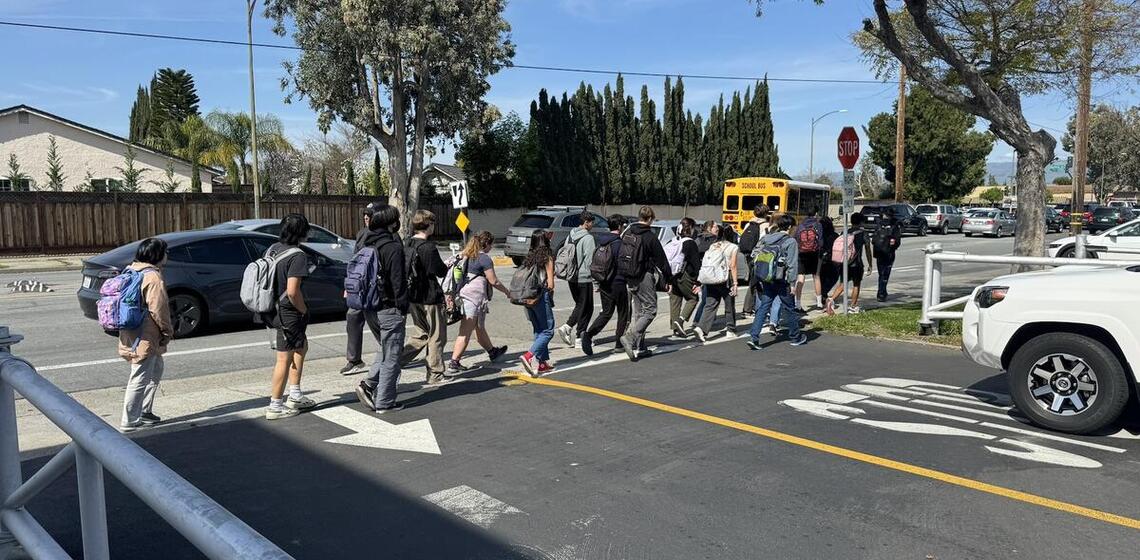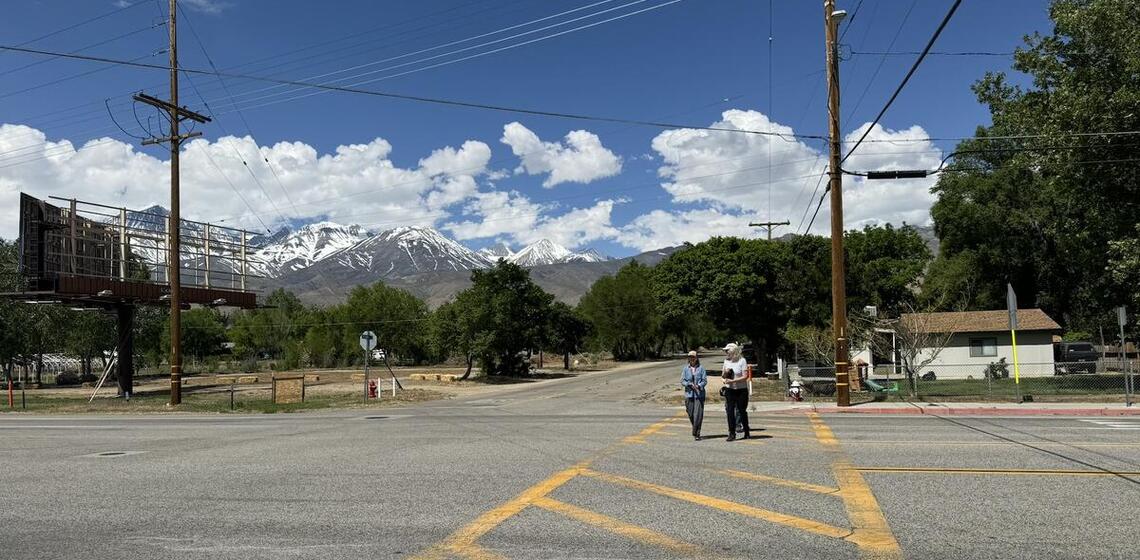Complete Streets Safety Assessments (CSSA)
SafeTREC is offering Complete Streets Safety Assessments (CSSA), which are free and available to California City, County, or Tribal implementing agencies (e.g., public works or transportation departments) as well as public universities. The CSSA is a comprehensive transportation safety assessment that focuses on pedestrian and bicycle safety. By participating, your community will gain expert insights into designing and implementing traffic safety solutions that protect all road users.
In addition to our standard CSSA programming, SafeTREC will offer a Safe Speed Limits Assessment (SSLA) add-on, which provides technical assistance for context-sensitive speed limit setting. Guided by the Safe System Approach, this project builds off SafeTREC’s California Safe Speeds Toolkit, which details speed limit setting flexibilities under the existing California framework.
Twelve sites will be selected for the CSSA and four sites will be selected for the CSSA with SSLA add-on, for a total of sixteen sites. Each selected site will be assigned a team of safety experts who will conduct an overview of the Safe System Approach and provide a review of crash history, a summary of current plans and policies, and a field audit of selected locations or corridors in the community. For sites selected for the SSLA add-on, the report will also include an Engineering and Traffic Survey (E&TS) review.
Program Commitment
Participant responsibilities for both programs consist of:
- Attending a virtual kickoff meeting;
- Participating in a policies and programs benchmarking survey;
- Attending the in-person field assessment; and
- Providing one round of consolidated feedback on the report.
An optional debrief meeting can be scheduled upon the completion of the field assessment. To be considered for the CSSA+SSLA supplemental, local agencies must be able to provide their current and previous E&TS.
Program Timeline
Apply now! Only a few slots remain open and applications will continue to be accepted on a rolling basis.
Up to four sites can be completed by June 15, 2026 in alignment with ATP Cycle 8. Completion of additional reports by this date may be possible contingent on favorable scheduling and staffing from both the Project Team and applicant. If using the CSSA report as part of an ATP application, be sure to indicate you’re interested in this opportunity when applying for the program.
All other reports will be completed by September 30, 2026.
This program is funded by the California Office of Traffic Safety (OTS), through the National Highway Traffic Safety Administration (NHTSA).
Resources
-
Pairing Speed Limit Reductions and Infrastructure to Lower Fatal and Serious (FSI) Crashes. Noelani Fixler, Melie Ekunno (2025): This research brief from UC Berkeley SafeTREC discusses how speed limit reductions, when paired with infrastructure design, enforcement strategies, and contextual land-use planning, can more effectively lower FSI outcomes.
-
California Safe Speeds Toolkit (2023): This toolkit is intended to help local jurisdictions across California set safer speed limits that accommodate all road users using Safe System principles. This toolkit consolidates key research on Safe Speeds, provides details on speed limit setting flexibilities under the existing California framework, highlights select speed limit setting case studies from cities across California, and points local jurisdictions toward next steps in pursuing safe speed limit setting.
-
Complete Streets and their effect on increasing safety for all road-users (2018): This research brief from UC Berkeley SafeTREC highlights the Complete Streets concept and its effect on increasing safety for pedestrians and bicyclists in communities.
-
A Technical Guide for Conducting Traffic Safety Assessments for California Communities (2015): This document describes the California Traffic Safety Assessments (TSA) process and provides guidelines for safety evaluators to conduct these assessments. It synthesizes best practices and research on traffic safety applications. This guidebook targets California Communities, but the methods described are applicable for other states.
-
A Technical Guide for Conducting Pedestrian Safety Assessments for California Communities (2013): Pedestrian Safety Assessments (PSAs) are one approach to improving pedestrian safety within California communities, because a PSA enables local agencies to systematically identify the issues and problems and effective remedial options. This document describes the California PSA process and provides guidelines for evaluators to conduct PSAs. While this book is targeted for application within California, the methods described are applicable outside California. Users of this guidebook outside California should substitute national or locally adopted standards, practices, or references as needed.
-
A Technical Guide for Conducting Bicycle Safety Assessments for California Communities (2014): Improving bicycle safety has become increasingly important to California communities, yet remains a challenge for many agencies to accomplish. A Bicycle Safety Assessment (BSA) helps identify safety concerns and offers suggestions for improvement. This document describes the California BSA process and provides guidelines for BSA evaluators to conduct BSAs. It synthesizes current best practices and research on bicycling safety and provides guidelines for bicycling safety applications tailored to meet the needs of local communities in California.
Questions about the CSSA program?
Please contact us at cssa@berkeley.edu if you would like more information about the program or have any questions.
Frequently Asked Questions
What does a Complete Streets Safety Assessment (CSSA) include?
Each selected site will be assigned a team of safety experts who will conduct an overview of the Safe System Approach and provide a review of crash history, a summary of current plans and policies, and a field audit of selected locations in the community. These findings will inform suggestions for policies and infrastructure physical improvements that could enhance motor vehicle, pedestrian, bicycle, and transit safety and accessibility. This team of safety experts will summarize these findings into a comprehensive report for each site.
What does a CSSA with a Safe Speed Limits Assessment (Safe Speed Limits) add-on include?
The CSSA with the SSLA add-on component will include the core elements of the CSSA program. In addition, applicants will need to share their current and previous Engineering and Traffic surveys (E&TS) with the Project Team. The E&TS will be reviewed to assess possible improvements to speed management for people walking, biking, driving, and taking transit. This analysis will be formally included in the final reporting, complementing the standard CSSA report content.
Why should I apply for the CSSA?
The CSSA helps local agencies in their planning for traffic safety projects for people walking and biking. Implementing agencies may leverage the objective technical expertise to support grant applications, and advocate for specific safety improvements in their community, or inform local plans and policies, e.g., capital improvement projects and pedestrian/bicycle master plans. The CSSA can also help implementing agencies engage regional partners in active transportation planning, such as neighboring cities, counties, Caltrans, and other stakeholders, to discuss joint opportunities for enhancing safety for all users of public and Tribal roadways.
Who is eligible for the CSSA?
- Cities with populations greater than 2,500
- Public schools and colleges
- All counties and Federally Recognized Tribes in California
Implementing agencies at the city, county, or tribal levels, along with public schools and universities are eligible to participate in the program.
What follow-up support does SafeTREC offer former CSSA sites?
SafeTREC will host a 2026 Peer Exchange series later this spring/summer. More information to come!
Since 2023, SafeTREC has hosted peer exchanges for former CSSA communities to support them as they work to implement the suggestions identified during their assessment. During each session, participants were introduced to the topic, networked with peers, and were invited to share successes and challenges encountered as they work to make walking and biking safer in their communities.
- 2025 Peer Exchanges:
- Leveraging the CSSA for funding opportunities: A case study from the City of Calabasas. City staff shared how they used their CSSA findings and program suggestions for their successful application for the 2024 SS4A Program, as well as insights about the application process, and plans for future funding.
- Beyond city limits: advancing safety through the CSSA – Lessons from Contra Costa County and CSU San Marcos. Agency representatives discussed best practices, challenges, and lessons learned when conducting the CSSA outside of the city-context and how these communities can leverage the program to align with local safety goals and implement safety improvements.
- 2024 Peer Exchange: Funding and the Importance of Public Involvement in Implementing Suggestions. Philip Soares, Traffic Engineer with the City of Modesto shared his agency’s experiences implementing safety improvements as suggested in their CSSA report, the challenges they faced and how they overcame them, and how they used the final report to gain funding and engage the public. Access the CSSA Peer Exchange Summary for insights, learnings, and highlights shared from the discussion.
- 2023 Peer Exchanges: Implementing Complete Streets Safety Assessment (CSSA) Improvements. SafeTREC launched two online peer exchange sessions on how local agencies are successfully implementing complete streets safety improvements to make walking, biking, and rolling safer in their communities. These peer exchanges were designed to support agencies as they work to implement safety improvements as suggested in their CSSA final reports.
What is the history of the CSSA?
The CSSA started in 1998 as a general Traffic Safety Assessment and was coordinated out of UC Berkeley TechTransfer. Over the next 20 years, the program prioritized different safety areas including active transportation, specific geographies, or target populations. In 2019, the CSSA moved to SafeTREC in alignment with the program’s emphasis to improve safety for all road users. The Safe Speed Limits Assessment (SSLA) element was initially piloted as a separate technical assistance resource in 2025 and is now expanding as a CSSA add-on in 2026.
As of 2025, we have conducted numerous safety assessments in a variety of program formats, including:
- 4 Safe Speed Limits (SSLA) pilots conducted in 2025
- 51 Tribal Transportation Safety Assessments (TTSAs) conducted 2015 through 2023
- 124 Complete Streets Safety Assessments (CSSAs) conducted 2015 through 2025
- 10 Rural Safety Assessments (RSA) conducted 2013 through 2015
- 6 Combined Pedestrian and Bicycle Safety Assessments conducted 2012 through 2015
- 6 Bicycle Safety Assessments (BSA) conducted 2012 through 2015
- 88 Pedestrian Safety Assessments (PSA) conducted 2007 through 2015
- 222 Traffic Safety Assessments (TSA) conducted 1998 through 2015
Funding for this program is provided by a grant from the California Office of Traffic Safety (OTS), through the National Highway Traffic Safety Administration (NHTSA).



